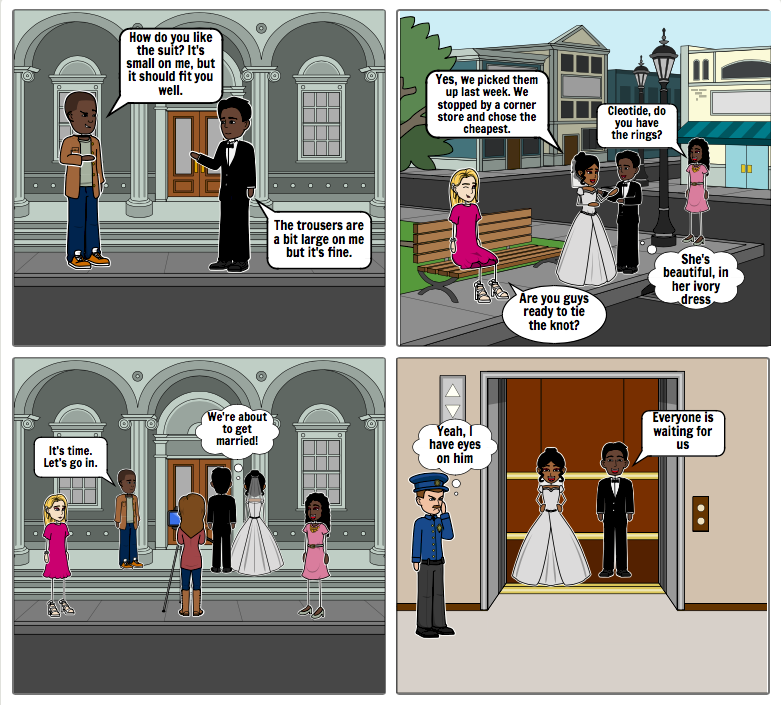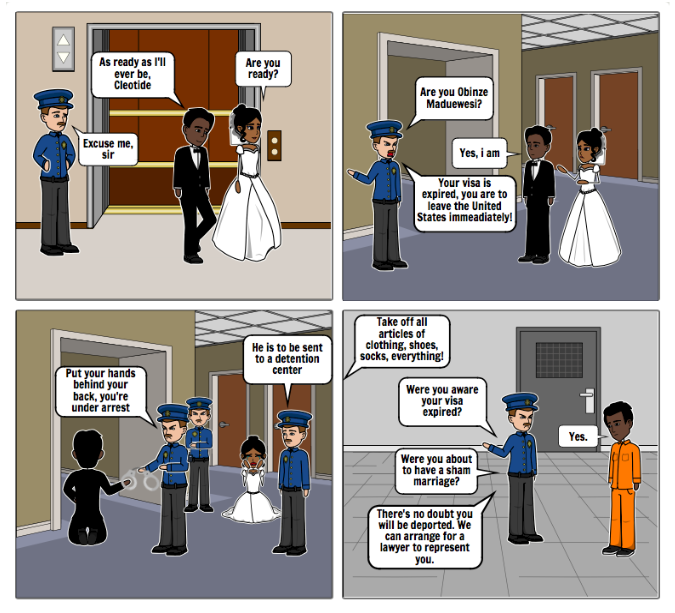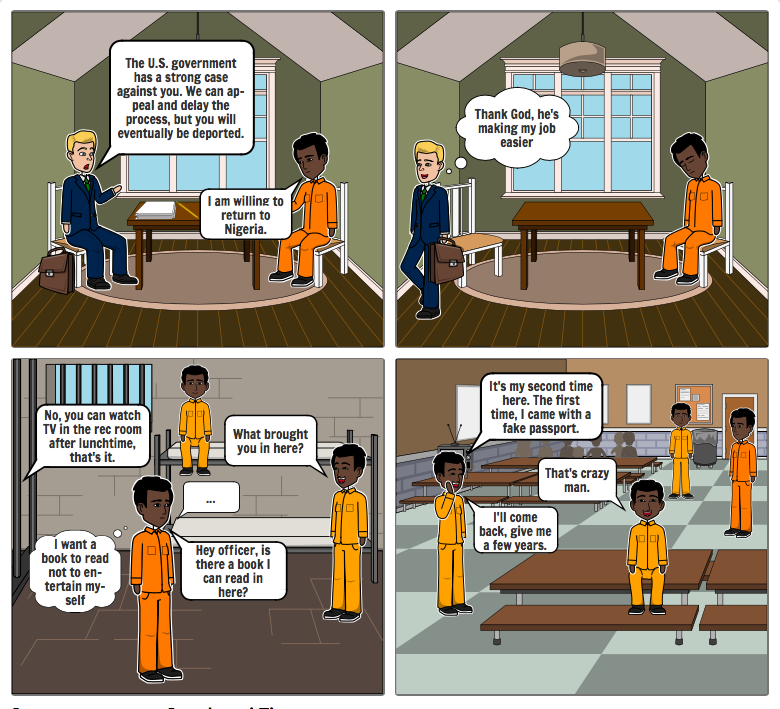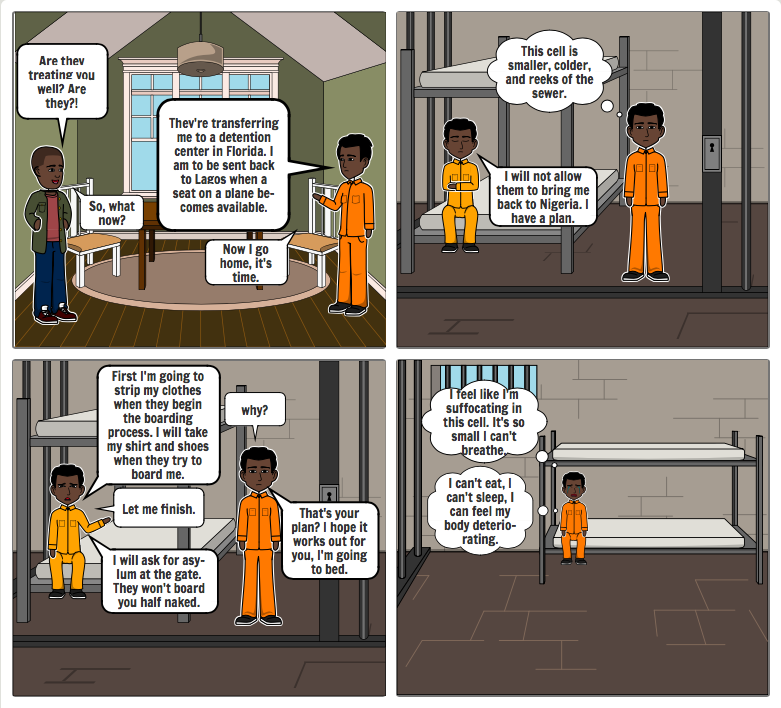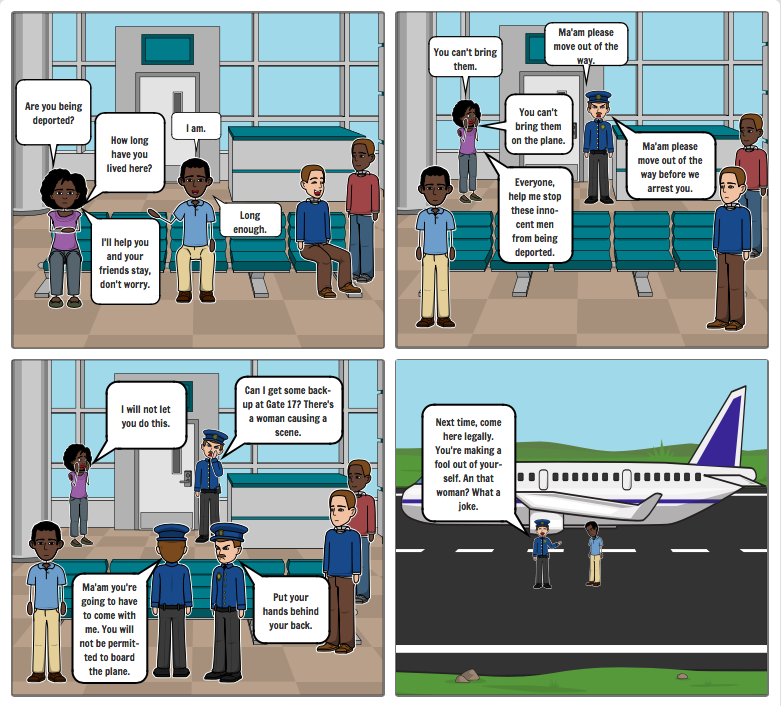Lans Tristan Abrenica & Annya Pereira
Pitch
The scene we have decided to depict from the novel Americanah is Chapter 30, when Obinze was getting arrested by immigration officers in England prior to completing his secret contract for permanent residency through marriage with Cleotide and his time in the detention center, up until his deportation. This scene is a common practice in many parts of the world, particularly in the United States. While there are many legal processes for acquiring permanent residency, one of the options is through what is commonly known as a “Green Card Marriage.” It is considered fraudulent and illegal. The scene highlights Obinze’s situation and resorting to marriage just to stay legally in the United Kingdom. In a dialogue between the policemen and Obinze, Obinze was being asked his legality (Adichie 344):
“Were you aware that your visa had expired?”
“Yes,” Obinze said.
“Were you about to have a sham marriage?”
This scene is important because it emphasizes people’s unwavering desire to live in foreign countries for a better life, while also portraying the struggles they face in pursuit of acquiring it. According to U.S. Citizenship and Immigration Services, U.S. citizens are able to petition their foreign national fiancé for a K-1 nonimmigrant visa to travel and apply for permanent residency (USCIS par. 1). This is similar to Obinze’s situation because he is marrying Cleotide to obtain his permanent resident status in the U.K. Obinze was trying to acquire his legal residency through this process with Cleotide, however, he was arrested and placed in a detention center moments before they were married.
In our remix of the chapter, we decided to we decided to use StoryboardTHAT as the medium to portray the scene because the audience are able to visually see the process that took place before his marriage, his arrest, and the detention center Obinze was placed at before his deportation. The setting we chose for our version is in the United States. Using a storyboard to showcase the marriage and arrest would have a greater impact on the audience as opposed to if they were to read it because they aren’t afforded the same visual cues as a storyboard.
Script
Character List:
Obinze: protagonist; a Nigerian man who moves to the United States and tried to become a citizen but ended up getting deported. He still loves Ifemelu a citizen but ultimately marries Kosi when he goes back to Nigeria then has a child.
Nicholas: Obinze’s cousin who lives in the United States and helps him with the marriage.
Cleotide: A woman who was paid to marry Obinze. She is a legal citizen of the United States.
Iloba: Obinze’s distant cousin who lives in the United States and helped him find work.
Scene 1 Script: The Arrival
Acquiring permanent residency status in the United States is known to be a long stringent process for anyone who applies. According to the official United States government website, one of the methods to be granted a green card is through spousal sponsorship. If an individual is a United States resident, they have the ability to sponsor a foreign spouse and receive permanent residency status (USAGov par. 12). Following this method has been a quick and common way for migrants to gain official immigration status in the United States. They are afforded almost the same rights as citizens, with limitations in voting participation and that it can be revoked under the right circumstances. Chapter 30 of Adichie’s Americanah focuses on Obinze’s legality in the United Kingdom and his unfortunate arrest moments before his wedding to Cleotide. We have decided to remix Chapter 30 to highlight the lengths migrants go just to obtain permanent residency status. In our version, the setting is in the United States rather than the United Kingdom because we believed it has more relevance to us, as we live in the United States.
Scene One depicts the preparation of a false marriage between Obinze and Cleotide. This scene is a representation of the number of false marriages that occur in the United States just to acquire permanent residency status. Like Obinze and Cleotide, spouses pay for their marriage and sign a contract to ensure the foreign spouse will receive permanent residency status.
Scene 1 Script:
1.1
Standing in front of the Civic Center all dressed up alone.
Nicholas: How do you like the suit? It’s small on me, it should fit you well.
Obinze: The trousers are a bit large on me but it’s fine.
1.2
Obinze sees Cleotide in the distance wearing her wedding dress surrounded by her friends.
Obinze thought bubble: She’s beautiful, in her ivory dress
Obinze approaches her by the trees and gives her a hug
Iloba: Cleotide, do you have the rings?
Cleotide: Yes, we picked them up last week. We stopped by a corner store and chose the cheapest
Friend: Are you guys ready to tie the knot?
1.3
They are back outside the Civic Center.
Iloba: It’s time. Let’s go in.
The group approaches the Civic Center, a photographer follows them from behind taking pictures.
1.4
Obinze opens the door to the Civic Center, two policemen standing inside by the doors
Obinze thought bubble: Everyone is waiting for us
A police officer stands by the side of the elevator suspiciously looking at Obinze.
Officer: Yeah, I have eye on him
Scene 2 Script: Obinze’s Arrest
In today’s current political climate, immigration officers face extreme pressure from the media and general public about the arrests of illegal immigrants. Arrests made by the United States Immigration and Customs Enforcements (ICE) rose significantly. According to Ron Nixon’s analysis of ICE data and statistics, “About 159,000 foreigners during the 2018 fiscal year that ended September 30, an increase of 11 percent from the previous year” (Nixon par. 2). ICE officers have been raiding suspected illegal immigrants in public places including their workplace. They would apprehend the individuals while they are working, at school, anywhere they are. Nixon also included “Officials said they also deported 256,085 people last year, a 13 percent increase from fiscal year 2017” (Nixon par. 4).
Scene Two is Obinze’s arrest at the Civic Center. He was arrested by the immigration officer before could marry Cleotide. Despite the important ceremony about to occur, he was arrested. While it is unfortunate Obinze was arrested, he was about to commit marriage fraud.
2.1
Obinze and Cleotide walks off of the elevator. Obinze notices a police officer glaring at him, but puts it off because it’s routine to have an officer in the Civic Center.
Cleotide: Are you ready?
Obinze: As ready as I’ll ever be, Cleotide.
Obinze and Cleotide steps off of the elevator and heads in the opposite direction as the officer and heads to the room
Officer: Excuse me, Mr. and Ms.
2.2
Obinze gets stopped and question by the police. He explains that he needs to leave the country. Cleotide stands a few feet away confused and scared.
Officer: Are you Obinze Maduewesi?
Obinze looks at the man with a straight face
Obinze: Yes, I am.
Officer: Your visa is expired, you are to leave the United States immediately.
Officer hands proper documents to Cleotide
2.3
The officer begins Obinze’s arrest. He hands the couple proper documentation and threatens deportation.
Three more officers enter the scene
Leading Arrest Officer: Put your hands behind your back, you’re under arrest.
Officer 1: He is to be sent to a detention center.
Cleotide falls to the ground and begins to cry
Officers walk towards the exit of the building
2.4
Obinze is taken to the police station and locked in a cell. He was told to take off all articles of clothing and gets informed he can arrange to have a lawyer.
Officer 2: Take off all articles of clothing, shoes, socks, everything!
With Obinze’s hands still handcuffed, they walk over to a cell
The cell was a small, grey concrete room with no windows. Metal bars align the entrance to the cell.
Officer 3: Were you aware your visa is expired?
Obinze: Yes
Officer 3: Were you about to have a sham marriage?
Obinze stayed quiet and kept walking. He knew saying anything more will build a stronger case against him.
Officer 3: There’s no doubt you will be deported. We can arrange for a lawyer to represent you.
Scene 3 Script: At the Detention Center
The treatment of detained immigrants at Detention Centers across the United States have been under criticism over the past few years. Personal stories of individuals experiencing subhuman treatment have been circulating the media more and more. One of the most critical conditions they face are sexual abuse. New York Times Matthew Haag stated that there are “more than 4,500 complaints about sexual abuse… [Records] detailed allegations that adult staff members had harassed and assaulted children, including fondling and kissing minors, watching them as they showered, and raping them” (Haag par. 1 & 2). The living conditions in detention centers have also been questionable. The Guardian’s Andrew Gumbel reported, “sleep was almost impossible; lights were left on… All they were given to eat were half-frozen bologna sandwiches and water with strong chlorine taste” (Gumbel par. 7).
The National Immigration Law Center provides a list of rights undocumented immigrants are entitled to, however, they state, “[migrants] have more rights if you are arrested by Immigration at work, on the street, after a traffic stop, or at home” (NICL par. 1). They warn that rights change depending on the location of their arrest. In airports or at the border, rights can be limited and could deny migrants a right to see a lawyer.
Scene Three depicts Obinze’s experience in a detention center where he was placed in a cold cell with three inmates awaiting for deportation. He was given a chance to meet with a lawyer to help his situation, but admits that he is willing to return back to his home country. It is a portrayal of Obinze’s wasted time doing nothing in his cell.
3.1
Obinze’s immigration lawyer enters an interrogation room.
Lawyer: The U.S. government has a strong case against you. We can appeal and delay the process, but you will eventually be deported.
Obinze: I am willing to return to Nigeria.
Obinze looks down at the table in sadness. The lawyer looks surprised at his response.
3.2
The immigration lawyer is walking out of the room.
Lawyer thought bubble: Thank God, he’s making my job easier.
Obinze sits on the chair silently as the lawyer leaves.
3.3
Obinze is brought back to his cell, along with two other Nigerian men.
Cellmate: What brought you in here?
Obinze: Ignores the question.
Obinze: Hey officer, is there a book I can read in here?
Officer: No, you can watch TV in the rec room after lunchtime, that’s it.
Obinze: Thinks to himself. I want a book to read not to entertain myself.
3.4
In the cafeteria room the other deportees scattered exchanging stories.
Man 1: It’s my second time here. The first time, I came with a fake passport.
Man 2: That’s crazy man.
Man 1: I’ll come back, give me a few years.
Obinze stands across the room, listening to them, admiring their determination to come back.
Scene 4 Script: Transferring to a Different Facility
One of the most critical conditions they face are sexual abuse. New York Times Matthew Haag stated that there are “more than 4,500 complaints about sexual abuse… [Records] detailed allegations that adult staff members had harassed and assaulted children, including fondling and kissing minors, watching them as they showered, and raping them” (Haag). The Trump administration has been under scrutiny over the child separation policy. In an article from NBCNews, it stated that children of immigrant parents that crossed the border illegally were taken by the Department of Health and Human Services, with no order to reunify them (Ainsley par. 2). There is no current report on the number of children who have been reunited with their family members. This issue does not only occur at the border, but also during transfers between facilities and spontaneous arrests.
Scene Four portrays Obinze’s transfer from his initial holding facility to another in Dover, England. Since our version is set in the United States, we picked Florida as the destination of his transfer. The new detention facility introduces him to a new cellmate who is determined to avoid deportation.
4.1
Back in the interrogation room with Obinze and Nicholas. He is visiting Obinze before he is placed on a flight.
Nicholas: Are they treating you well? Are they?!
Obinze: They’re transferring me to a detention center in Florida. I am to be sent back to Lagos when a seat on a plane becomes available.
Nicholas: So, what now?
Obinze: Now I go home, it’s time.
4.2
In a Florida detention center. Obinze is sitting in his cell shared with one man also waiting to get on a flight to Lagos.
Obinze thought bubble: This cell is smaller, colder, and reeks of the sewer.
Cellmate: I will not allow them to bring me back to Nigeria. I have a plan.
4.3
Obinze’s cellmate continues to discuss his plan
Cellmate: First I’m going to strip off my clothes when they begin the boarding process. I will take off my shirt and shoes when they try to board me.
Obinze: Why?
Cellmate: Let me finish.
Cellmate: I will ask for asylum at the gate. They won’t board you half naked.
Obinze: That’s your plan? I hope it works out for you, I’m going to bed.
4.4
Obinze is sitting on his bed in deep thought.
Obinze thought bubble: I feel like I’m suffocating in this cell. It’s so small I can’t breathe.
Obinze’s face turns blue from sadness.
Obinze thought bubble: I can’t eat, I can’t sleep, I can feel my body deteriorating.
Scene 5 Script: At the Airport
As more attention is brought to the general public about the deportation process and arrests of undocumented immigrants, some U.S. citizens have stepped up to prevent the deportations of the immigrants. In one instance, a New York activist, Bryan MacCormack blocked an attempted arrest of two undocumented immigrants in his car by ICE agents. The agents attempted to manipulate MacCormack saying their warrant allow them to take custody of the immigrants, but MacCormack noticed that the warrant was not signed by a judge, therefore they cannot enter his private space (Sheets par. 7). Other similar situations have circulated the media of citizens attempting to delay the deportation of immigrants.
Scene Five is a depiction of Obinze’s return to Nigeria. In the novel, no one tries to stop his deportation. In our version, he has not returned to Nigeria yet, but we decided to create a scene in which a bystander attempts to delay his flight.
5.1
Obinze and three other deportees are escorted around Miami International Airport with handcuffs. They gather near the gate going to Lagos. A woman sits near Obinze and makes conversation.
Woman: Are you being deported?
Obinze: I am.
Woman: How long have you lived here?
Obinze: Long enough.
Woman: I’ll help you and your friends stay, don’t worry.
5.2
The plane begins the boarding process and the woman makes a commotion. She stands in the way of the officers trying to bring the deportees onto the plane.
Woman: You can’t bring them.
Officer: Ma’am please move out of the way.
Woman: You can’t bring them on the plane.
Woman: Everyone, help me stop these innocent men from being deported.
Officer: Ma’am please move out of the way before we arrest you.
5.3
The woman was relentless and stood her ground.
Officer: Can I get some backup at Gate 17? There’s a woman causing a scene.
Woman: I will not let you do this.
Two officers arrive at the scene and apprehends the woman.
Officer 1: Ma’am you’re going to have to come with me. You will not be permitted to board the plane.
Officer 2: Put your hands behind your back
The woman is handcuffed and escorted by the two officers. Obinze and the other deportees are boarding the plane.
5.4
The officer taunts Obinze as they board the plane, mocking his situation.
Officer: Next time, come here legally. You’re making a fool out of yourself. And that woman? What a joke.
Obinze keeps his eyes on the ground as he is about to board the plane.
Conclusion
Marriage fraud, undocumented immigration, and arrest methods has been an important issue in American society the past few years. Obinze’s experience as an illegal immigrant in pursuit of permanent residency through marriage is common among foreign individuals searching for a better life. While there are legal and safer ways to accomplish legal permanent residency, it is usually not guaranteed and requires time, money, privilage, and a lot of luck. It is important to know become aware of the situations immigrants face on a regular basis and possible ways others can help through activism and raising awareness.
Annotated Bibliography
Adichie, Chimamanda Ngozi. Americanah (Ala Notable Books for Adults) (p. 342-351). Knopf Doubleday Publishing Group. Kindle Edition.
Julia Ainsley’s article “Thousands More Kids Separated from Parents under Trump Than Previously Reported” analyzed reports from the United States Department of Health and Human Services (HHS). The author included statistics that compared the number of reports from 2017 and 2018. The article is critical of the reports due to the lack of government information about the children that have been separated. The reports from HHS only mentioned the reports of separated children, but nothing about their reunification.
The source is reliable and credible. NBC News is a popular news site and is usually accurate in their reports. Ainsley’s article in itself used data from the Federal Government and presented it. Their is obvious bias in the article by the use of quotes that criticized the Trump administration and the policies that allowed the continuance of child separation.
Ainsley, Julia. “Thousands More Kids Separated from Parents under Trump than Reported.” NBCNews.com, NBCUniversal News Group, 17 Jan. 2019, www.nbcnews.com/politics/immigration/thousands-more-migrant-kids-separated-parents-under-trump-previously-reported-n959791.
The article gives advice to immigrants who don’t know their rights. It lets them know what they should do if they ever get arrested. The main idea of the article is that you should wait for a lawyer and do not speak to anyone until after you speak with your lawyer. It is possible to claim asylum before getting deported if a detainee is afraid of going back to their home country. I thought this was a reliable article because they were truthful and insightful about immigration. It was in the best interest for immigrants. Immigrants have more rights if they are arrested at work, home, or on the street then they would at the border or airport. Most immigrants probably did not know that and that is very beneficial to know to help their cases.
NILC. “Arrest or Detention by Immigration.” National Immigration Law Center, Aug. 2007, www.nilc.org/get-involved/community-education-resources/know-your-rights/to_do_if_arrested_2007-08/.
This was a powerful story written by Daily Mail. It’s a story about a citizen who was transporting two undocumented immigrants from court about a minor traffic citations. ICE pulled over Bryan MacCormack who was transporting the undocumented immigrants in the back seat. When ICE officials approached his car, they said they were looking for the two people in the back seat and were going to arrest them. ICE presented a document authorized by the Department of Homeland Security, however, that warrant does not authorize agents to make the arrest. MacCormack insisted there needed to be warrant signed by the judge to make a judiciary arrest however, they did not have it so agents called in for backup while MacCormack called his lawyer. MacCormack and the passengers were able to leave and go on their way since he was right. MacCormack is an executive director of the Columbia County Sanctuary Movement and makes sure to show them what the difference looks like. This article is reliable because it is a real story but it is a bit bias since it favors immigrants and it’s an article from daily mail.
Sheets, Megan. “Activist Blocks ICE Arrest of Two Undocumented Immigrants by Explaining Constitutional Rights .” Daily Mail Online, Associated Newspapers, 28 Mar. 2019, www.dailymail.co.uk/news/article-6860163/Activist-blocks-ICE-arrest-two-undocumented-immigrants-explaining-constitutional-rights.html
The article is an informative source about the living conditions of migrants in detention centers in the United States. The facility Andrew Gumbel visited was a detention center in the Rio Grande valley in southern Texas. Gumbel interviewed the detained migrants about their experience from the food they were fed, sleeping areas, and the health concerns in the facility. He provided personal experiences about a child become sicker by the day and how the officials that run the facility deals with them.
The source is from The Guardian which is an online source that reports national and international news for online readers. The article Gumbel’s article leans towards the leftist side on the political spectrum and is evident by the use of words the inspire sympathy for those held in the detention center. The author reported first hand experiences of the migrants and provided pictures of the detention center as an example of what a normal facility looks like. The author has worked as a foreign correspondent in Europe, the Middle East, and the United States.
Gumbel, Andrew. “’They Were Laughing at Us’: Immigrants Tell of Cruelty, Illness and Filth in US Detention.” The Guardian, Guardian News and Media, 12 Sept. 2018, www.theguardian.com/us-news/2018/sep/12/us-immigration-detention-facilities.
Matthew Haag’s article analyzes the reports of sexual abuse and harassment detained children experienced in U.S. custody. The author included statistics from the United States Health and Human Services department about the complaints against workers in the detention centers. He included statistics that ranged from major complaints to minor complaints. The article is more informative, but there is subliminal biases against the Trump administration that criticizes its handling of the immigration issue and the children in the detention facilities.
The article comes from a reliable news source The New York Times. However, there is a usual bias in their reports that leans towards the left. The article is obviously critical of the detention centers. The author is a general assignment reporter for The New York Times and was previously a copy editor for The Times.
Haag, Matthew. “Thousands of Immigrant Children Said They Were Sexually Abused in U.S. Detention Centers, Report Says.” The New York Times, The New York Times, 27 Feb. 2019, www.nytimes.com/2019/02/27/us/immigrant-children-sexual-abuse.html.
The website discusses immigration laws and lawful methods of acquiring permanent residency in the United States. The source specifically mentions the process for acquiring a green card through spousal sponsorship. The website is the most reliable for green card information because it’s directly from the United States government. The website also provides information about citizenship, residency forms, and legal resources.
The website is relevant to the project because our focus is about acquiring permanent residency status through marriage. The government website provides all the necessary and accurate information. The information provided has been reviewed in 2018.
“K Nonimmigrant.” USCIS, 2 Sept. 2009, www.uscis.gov/greencard/fiancees.
This article gave a lot of statistics about detention centers and the amount of people who get detained. Many detainees are held in private detention centers rather than public ones because it is costly having immigrants in detention centers. The charts present the data of all private detention centers. It also shows charts of where immigrants get detained the most and the age group that gets detained the most. According to the chart, 26- 35 year olds are the most likely ones. There is another chart showing where they come from with the most coming from Central America. It shows multiple charts for abuse and length of stay in detention centers. This article is reliable because it shows more than you can see anywhere. It is difficult to find actual statistics on immigration since they run the risk of getting caught. However, I feel it could be slightly biased about how bad it could be since it is a website to help immigrants.
“Detention Map & Statistics.” Edited by Cindy Knoebel, Freedom for Immigrants, 2018, www.freedomforimmigrants.org/detention-statistics.
The article reports the rise in immigration arrests and deportation since the Trump administration. The author, Ron Nixon, provided statistics from government data provided by the Immigration and Customs Enforcement. The author reported the demographics of the arrested individuals, claiming that most have a criminal records.
The source is reliable and relevant to our final project due to the statistics it provides about the arrests and deportations by the government. The author provided information derived from a government agency. While the article had a statistical typo, there is a footnote at the end that corrected the statement into a more factual one. Ron Nixon is a homeland security correspondent that covers border and aviation security, immigration and other fields of security.
Nixon, Ron. “Immigration Arrests and Deportations Are Rising, I.C.E. Data Show.” The New York Times, The New York Times, 14 Dec. 2018, www.nytimes.com/2018/12/14/us/politics/illegal-immigrant-arrests-deportations-rise.html.
This article is an official website of the United States government. It explains how to get a green card or to check your status. There are multiple links to send you to renew, apply, or check status. It also advises you to beware of any scams since people like taking advantage to get their information. It also shows the eligibility requirements for the visa but also mention that it is a lottery to get a visa. It also gives you the option of being sponsored by a spouse, child, or family member. It explains how that process works which is difficult depending on who is sponsoring you. This article is reliable because it is a government website but it also gives a lot of information about immigration and how to obtain certain documents.
USAGov. “Green Cards and Permanent Residence in the U.S.” USAGov, 7 Mar. 2019, www.usa.gov/green-cards.
